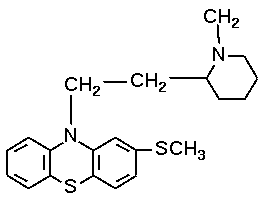Thioridazine
Thioridazine is a piperidine phenothiazine antipsychotic drug and is used in the treatment of schizophrenia and psychosis. more...
Thioridazine is a typical low-potency neuroleptic that is slighly less potent than chlorpromazine. It has a halflife of 7 to 13 hours. (Other sources have 16 to 24 hours.) It has the advantage of a low incidence of early and late extrapyramidal side-effects (tardive dyskinesia). In this regard it is very similar to the atypical neuroleptic clozapine (Clozaril®). Thioridazine has also intrinsic mild to moderate antidepressive properties. It has antiemetic properties. Sedation is said to be less pronounced compared with chlorpromazine.
Indications
Previous additional indications were agitated depression, tension and anxiety linked to alcohol withdrawal and dysphoria of epileptic patients. It had even (Melleretten® in Europe) an indication for the treatment of psychosis in children and adolescents (10mg to 60mg daily).
It was also given off-label for the treatment of insomnia and for alleviation of opiate withdrawal.
Thioridazine is known to kill multidrug-resistant mycobacterium tuberculosis and MRSA at clinical concentrations..
Metabolism
Thioridazine is a racemic compound with two enantiomers, both of which are metabolized, according to Eap et al, by CYP2D6 into (S)- and (R)-thioridazine 2-sulfoxide, better known as mesoridazine, and into (S)- and (R)-thioridazine-5-sulfoxide. Mesoridazine is in turn metabolized into sulforidazine. Thioridazine is an inhibitor of CYP1A2 and CYP3A2
Side Effects
Central nervous system side-effects occur. These are mainly drowsiness, dizziness, fatigue, and vertigo. Early and late extrapyramidal side-effects are seen only infrequently (less than 1% altogether). There is no clear dose-effect relationship, as with higher doses anticholinergic effects of thioridazine become more prominent.
Thioridazine causes also an unusual high incidence of impotence and anorgasmia due to a strong alpha-blocking activity. Painful ejaculation or no ejaculation at all is also sometimes seen.
Autonomous side-effects (dry mouth, urination-difficulties, obstipation, induction of glaucoma, postural hypotension, and sinus tachycardia) occur obviously less often than with most other mildly potent antisychotics.
Thioridazine is no longer recommended as first-line treatment due its side-effect of prolonging the QT interval on the EKG. Thioridazine-5-sulfoxide is responsible for the (ventricular tachycardia, torsades de pointes) according to Heath, Svensson and Martensson.
Read more at Wikipedia.org



